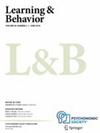What have we learned from research on the "geometric module"?
IF 1.9
4区 心理学
Q3 BEHAVIORAL SCIENCES
引用次数: 0
Abstract
This article is an overview of the research and controversy initiated by Cheng's (Cognition, 23(2), 149-178, 1986) article hypothesizing a purely geometric module in spatial representation. Hundreds of experiments later, we know much more about spatial behavior across a very wide array of species, ages, and kinds of conditions, but there is still no consensus model of the phenomena. I argue for an adaptive combination approach that entails several principles: (1) a focus on ecological niches and the spatial information they offer; (2) an approach to development that is experience-expectant: (3) continued plasticity as environmental conditions change; (4) language as one of many cognitive tools that can support spatial behavior.
我们从“几何模块”的研究中学到了什么?
本文概述了Cheng(《认知》,23(2),149-178,1986)的一篇假设空间表征中存在纯几何模块的文章所引发的研究和争议。在进行了数百次实验之后,我们对各种物种、年龄和各种条件下的空间行为有了更多的了解,但对这些现象仍然没有一个共识模型。我主张采用一种适应性组合方法,它包含以下几个原则:(1)关注生态位及其提供的空间信息;(2)以经验为期待的发展方式;(3)随着环境条件的变化而持续的可塑性;(4)语言是支持空间行为的众多认知工具之一。
本文章由计算机程序翻译,如有差异,请以英文原文为准。
求助全文
约1分钟内获得全文
求助全文
来源期刊

Learning & Behavior
医学-动物学
CiteScore
2.90
自引率
5.60%
发文量
50
审稿时长
>12 weeks
期刊介绍:
Learning & Behavior publishes experimental and theoretical contributions and critical reviews concerning fundamental processes of learning and behavior in nonhuman and human animals. Topics covered include sensation, perception, conditioning, learning, attention, memory, motivation, emotion, development, social behavior, and comparative investigations.
 求助内容:
求助内容: 应助结果提醒方式:
应助结果提醒方式:


